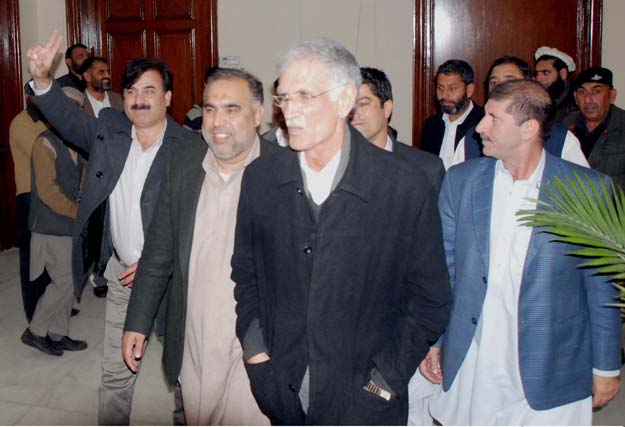
Horse-trading and internal bickering within PTI’s ranks caused sleepless nights for the ruling party in K-P ahead of Senate polls, but its leadership—and the governing coalition—breathed a sigh of relief as their candidates easily won all seven seats they contested in the Upper House.
There were fears that PTI’s troubles would rock the boat, but Mohsin Aziz, Liaqat Tarakai, Shibli Faraz won their general seats, while Nauman Wazir won a technocrat berth and Samina Abid easily secured a women’s seat in the Upper House. Crucially, JI chief Sirajul Haq, a coalition ally in the K-P government, managed to find his way to the Senate for the first time in his political career. Liaqat is the father of Shahram Tarakai, health minister and leader of Awami Jamhoori Ittehad Pakistan.
At a press conference at the JI headquarters in the provincial capital on Friday, Haq said, “For the first time, affluent candidates with a penchant for reaching the Senate through unfair means have failed in their tricks.”

He added, “Perhaps in some cases, voting for money did take place, however, that money failed to make an impact.” The coalition lawmakers foiled stalwarts who “knew the ins and outs of using unfair means to get to the Senate,” said the JI chief.
“But lawmakers have elected new senators and it is now our time and test to raise our voice for the rights of the province.”
The newly-elected senator called for reforms to the electoral system. The relevant committee needs to solicit public opinion on the matter, he added.“Talent and ability should take people to the Upper House, not wealth and land holdings,” said Haq.
Manoeuvring
Chief Minister Pervez Khattak’s well-orchestrated strategy not only led to his party’s comfortable victory, but also bruised PTI’s political opponents’ egos. PTI and its allies not only won all their contested seats but also managed to rein in their lawmakers from succumbing to temptations that helped change the Senate landscape for years. The Senate poll was a delicate balancing act for Khattak. He managed to forge political alliances while adhering to the idealistic approach of Imran Khan. For his part, Khattak tried to pull one last trick out of his sleeve by pulling together a loose coalition with PML-N and QWP. However, Imran Khan torpedoed the idea of supporting the latter.
Theoretically, if this alliance was allowed to materialise, it would have helped PTI divide the K-P opposition and stopped JUI-F, ANP and PPP from sending three members to the Upper House.
According to reports, the ruling party kept its side of the bargain with PML-N and propelled its candidate Javed Abbasi to a technocrat seat at the cost of JUI-F, which would have claimed the berth otherwise.
Winners and losers
ANP and PPP manage to secure a seat apiece with their five members each in the K-P Assembly, while PML-N secured two seats—general and technocrat—with its 16 members.
JUI-F, the largest opposition party, and QWP, the third largest party, were among the losers. As the five-party opposition failed to unite over the distribution of tickets, the trio JUI-F, PPP and ANP, with a total strength of 27 provincial assembly seats, joined hands. This left the QWP and PML-N to fend for themselves.
The tripartite coalition secured three seats: two general for JUI-F’s Maulana Attaur Rehman and PPP’s Khanzada Khan as well as a technocrat’s berth for ANP’s Sitara Ayaz. While PML-N managed its two seats, the QWP remained the only party without a Senate berth to its name.
QWP’s loss is also likely to precipitate the downfall of a wealthy family from DI Khan which made it to the Upper House as a norm.
Published in The Express Tribune, March 7th, 2015.

1717587923-0/jake-paul-vs-mike-tyson-(1)1717587923-0-165x106.webp)


1725443747-0/Untitled-design-(5)1725443747-0-165x106.webp)






COMMENTS (1)
Comments are moderated and generally will be posted if they are on-topic and not abusive.
For more information, please see our Comments FAQ